| |
news of Bible translation
2005
25.11.2005 |
New
IBT Editions in Caucasian Languages
The
usual time of harvest is autumn, but the Institute for Bible
Translation is harvesting all year round. In November, practically
simultaneously, three books came from the printer – this time in
Caucasian languages: The Gospel of Luke in Agul and
Ingush and a book called “People in times of suffering”,
containing the books of Esther,
Ecclesiastes, Lamentations and
Daniel in the Chechen
language. For the Aguls and Ingush,
these are the first
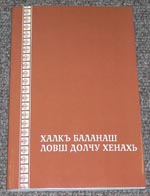 Bible
portions ever printed in their languages! All three
translation
projects
are carried out in co-operation
with SIL. Bible
portions ever printed in their languages! All three
translation
projects
are carried out in co-operation
with SIL.
Chechen
In
Chechen IBT has already published several books. The first trial
edition of the Gospel of John was published in 1986, the Gospel of
Luke in 1998, and a book containing Genesis, Jonah and Ruth in
2002. Now a collection of four Old Testament books is presented to
the Chechen readers. And the diligent and
professional Chechen translation team has
big
plans for the future – in a few years the whole Bible
will
be ready for publication!
Agul
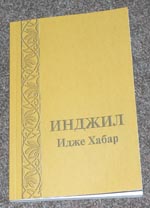 According
to the latest census in 2002, 28,000 people speak Agul in Russia.
The homeland of the Aguls is the high mountainous areas of
Southern Dagestan. Their main occupation According
to the latest census in 2002, 28,000 people speak Agul in Russia.
The homeland of the Aguls is the high mountainous areas of
Southern Dagestan. Their main occupation
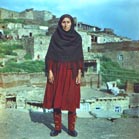 is
agriculture. Before the collapse of the Soviet Union the Aguls had
to indicate in their passports that they were of Lezgi
nationality. The Agul written language was developed only in the
early 1990s. So the Gospel of Luke is the first Bible text in
Agul, and at the same time one of the very first books in the Agul
language. Since not many Aguls are good at reading their own
language, an audio recording
of the Gospel text is being prepared, which we hope will be
useful. Next IBT Russia is planning to publish parables from the
Gospel of Luke in Agul with illustrations. is
agriculture. Before the collapse of the Soviet Union the Aguls had
to indicate in their passports that they were of Lezgi
nationality. The Agul written language was developed only in the
early 1990s. So the Gospel of Luke is the first Bible text in
Agul, and at the same time one of the very first books in the Agul
language. Since not many Aguls are good at reading their own
language, an audio recording
of the Gospel text is being prepared, which we hope will be
useful. Next IBT Russia is planning to publish parables from the
Gospel of Luke in Agul with illustrations.
Ingush
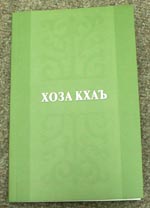 The Ingush people count about 415,000, according to the 2002
Census. The Ingush language is related to Chechen. Both languages
belong the Nakh group of the Caucasian language family. The Ingush
alphabet was created at the beginning of the 20th century, first
on the basis of Arabic script, then in Latin script and finally
transferred to Cyrillic script in 1938. The Republic of Ingushetia
was formed only in 1992 and this gave a powerful stimulus for the
development of its national science and culture. The Ingush people count about 415,000, according to the 2002
Census. The Ingush language is related to Chechen. Both languages
belong the Nakh group of the Caucasian language family. The Ingush
alphabet was created at the beginning of the 20th century, first
on the basis of Arabic script, then in Latin script and finally
transferred to Cyrillic script in 1938. The Republic of Ingushetia
was formed only in 1992 and this gave a powerful stimulus for the
development of its national science and culture.
The IBT co-workers and the members of the Chechen, Agul and Ingush
translation teams hope that the new books will be a great blessing
to these peoples. May the Bible message help to overcome fear and
distrust, and may the texts lead to mutual understanding and
mutual enrichment of nations and cultures.
11.11.2005 | International
meetings
 The
first Annual Gathering under IBT’s new structure took place on 11
November 2005 at IBT’s office in Moscow. Present were friends of
IBT Russia from England, USA and the Netherlands, as well as the
whole staff of IBT Moscow and representatives from the Russian
Board. The
first Annual Gathering under IBT’s new structure took place on 11
November 2005 at IBT’s office in Moscow. Present were friends of
IBT Russia from England, USA and the Netherlands, as well as the
whole staff of IBT Moscow and representatives from the Russian
Board.
An
interesting program had been prepared by Translation Consultant
Andrei Desnitsky.
Several co-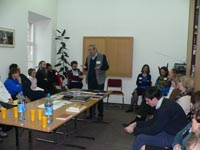 workers
spoke about their special areas – various translation projects,
publishing, bookkeeping, information, distribution and computer
maintenance. workers
spoke about their special areas – various translation projects,
publishing, bookkeeping, information, distribution and computer
maintenance.
On
the following day, 12 November, the International Advisory Board
(IAB) had a very productive first meeting, where, among other
things, the following subjects were discussed: adapting to IBT’s
new structure; plans for 2006 and the future of IAB; fundraising
goals for 2006; and further project development. Dr Richard
Williams of IBT UK was elected the IAB Chairman for one year.
20.09.2005 |
Colloquium on translating the Bible for peoples of the Muslim
tradition
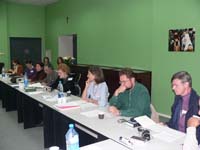 How
does a Christian checker work with a Muslim translator? What is it
like to be part of a Christian minority among a Muslim majority?
How do we use Muslim religious terminology? What are the Muslim
elements in the traditional cultures of peoples who live on the
borders of the Muslim world but mainly profess the Christian
faith? These were just some of the subjects discussed at a
colloquium organized by IBT at St. Andrew’s monastery in Moscow
19-20 September How
does a Christian checker work with a Muslim translator? What is it
like to be part of a Christian minority among a Muslim majority?
How do we use Muslim religious terminology? What are the Muslim
elements in the traditional cultures of peoples who live on the
borders of the Muslim world but mainly profess the Christian
faith? These were just some of the subjects discussed at a
colloquium organized by IBT at St. Andrew’s monastery in Moscow
19-20 September
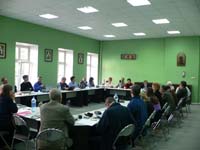 2005. More
than 20 translators and checkers participated – from Chuvashia,
Tatarstan, Kabardino-Balkaria, Uzbekistan, Kazakhstan, the Czech
Republic, USA and Great Britain – representing IBT, SIL and CARS. 2005. More
than 20 translators and checkers participated – from Chuvashia,
Tatarstan, Kabardino-Balkaria, Uzbekistan, Kazakhstan, the Czech
Republic, USA and Great Britain – representing IBT, SIL and CARS.
Sharing experiences and exchanging views proved to be very
productive and interesting for all the participants. A pleasant
and useful surprise for them was the book of parallel passages
from the Bible and the Koran, published by IBT especially for this
event.
05.09.2005 |
“Prophets” in the Crimean Tatar
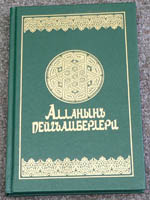 A
new book called “Prophets” was recently published by IBT (in
cooperation with Pioneer Bible Translators) in the Crimean Tatar
language. It is the first book ever with Old Testament portions in Crimean Tatar. “Prophets” contains the Old Testament
stories of people that are known both in Islam and in Christianity.
It includes selections from Genesis, Exodus, 1 and 2 Kings, 1
Chronicles, Daniel, Jonah and also some small portions from the
New Testament. A
new book called “Prophets” was recently published by IBT (in
cooperation with Pioneer Bible Translators) in the Crimean Tatar
language. It is the first book ever with Old Testament portions in Crimean Tatar. “Prophets” contains the Old Testament
stories of people that are known both in Islam and in Christianity.
It includes selections from Genesis, Exodus, 1 and 2 Kings, 1
Chronicles, Daniel, Jonah and also some small portions from the
New Testament.
Crimean Tatars
reading this book will find the stories of the creation of the
world; of Adam, the first human being; how Noah built the ark; of
God’s friend, Abraham (whom Muslims call “Ibrahim”); of Joseph,
who became the second most important person in Egypt; of Moses,
who brought the Israelites out of slavery; of David’s victory over
Goliath; of Solomon, who built the first temple; of Daniel in the
lion’s den, and of Jonah being swallowed by the big fish.
The stories of
each of these “prophets” (as righteous people in the Bible are
called in Islam) are accompanied by excerpts from the New
Testament, which help us to look afresh at the lives of these
people and make connections with our own life.
We hope that this
small book will interest the Crimean Tatar readers in the Holy
Scriptures and prepare them for the full Bible, which is now being
translated.
23.08.2005 |
First
translation of Luke’s Gospel in
Baluchi
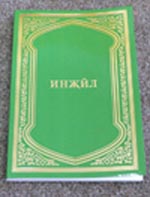 The
plan to translate the Bible for the Baluchis living in
Turkmenistan was formulated by IBT as early as 1990. However, the
first works of translation were completed only seven years later.
To date the four Gospels, Acts and Revelation have been translated
into Baluchi, although only Luke’s Gospel has been published. The
remaining books still have to be checked and require further work.
Unfortunately the difficult political situation in Turkmenistan
has hindered progress on the project. The
plan to translate the Bible for the Baluchis living in
Turkmenistan was formulated by IBT as early as 1990. However, the
first works of translation were completed only seven years later.
To date the four Gospels, Acts and Revelation have been translated
into Baluchi, although only Luke’s Gospel has been published. The
remaining books still have to be checked and require further work.
Unfortunately the difficult political situation in Turkmenistan
has hindered progress on the project.
The dialect of the Baluchis
of Turkmenistan is called Rakhshanish, which is spoken by about
50,000 people. It differs greatly from the other Baluchi dialects
of Pakistan, and of Iran and Afghanistan. The latter are written
in Arabic script. At the beginning of the 1930’s a script based on
the Latin script was
developed for the Baluchi spoken in Turkmenistan. However, this
lasted only until 1938. During this time some school books and
political information material were published in Baluchi. In 1938
the Latin alphabet was replaced by Cyrillic, but in the period of
1938-89 no books or papers were printed in Baluchi. The language
enjoyed no official status and survived only as a spoken language.
Nevertheless, the Baluchis did not forget their native tongue
because it was the only language that they used in everyday life.
At the end of the nineteenth
century translation of the Bible began into two widespread
dialects in Pakistan. One of the two was the so-called coastal
dialect, spoken mainly in Karachi. However, these dialects are
incomprehensible to the Baluchis of Turkmenistan, so that a
translation into their own dialect was necessary.
All the participants in the
Baluchi translation project have a philological education and work
as school teachers of Baluchi. One of them was the first Baluchi
teacher to teach the mother tongue as a separate subject. He is
the author of two textbooks for teaching Baluchi to primary
schoolchildren.
One of the necessary steps in
the translation process - comprehension testing - was carried out
in unusual circumstances. The Baluchis lay reclining as they
drank tea and listened enthralled as their guest read to them.
During the process the testees made remarks, but the conclusion
regarding the comprehensibility of the text was not a matter of
individual taste. The final decision on the quality of the
translation was taken by a majority vote!
The Baluchis of Turkmenistan
are Sunni Muslims. Many of them are devout followers of their
faith. In such a situation it is important that the biblical texts
are also accepted by the Muslim readership. It was therefore
decided that the first biblical text in Baluchi should be
published not only in Cyrillic but also in Arabic script.
We hope that the first
edition of the translation of Luke’s Gospel will bring joy to the
Baluchis, and that they will seek in it not only stories about
the life and work of the prophets, which they already know from
the Koran, but that they will discover a whole new world.
29.06.2005
|
IBT issues the first biblical text in
Nganasan - excerpts from Luke’s Gospel
 “It
is important that one of the first books in our language is a
Bible portion. I have been especially interested in working on the
translation because I know that it will be used by future
generations,” said Svetlana Zhovnitskaya. She has translated
excerpts from Luke’s Gospel into her native language, Nganasan.
The book arrived from the printing house in June 2005. “It
is important that one of the first books in our language is a
Bible portion. I have been especially interested in working on the
translation because I know that it will be used by future
generations,” said Svetlana Zhovnitskaya. She has translated
excerpts from Luke’s Gospel into her native language, Nganasan.
The book arrived from the printing house in June 2005.
All the reference works published up to 1994 stated that the
Nganasan people did not have a written language. But since then
the situation has changed – and it was Svetlana who was the author
of the first alphabet book in Nganasan.
Translating Luke’s Gospel into Nganasan was not easy. Since there
was simply no other literature in the language, new expressions
had to be coined for biblical words such as “the kingdom of God”,
“temple”, “servant”, etc – there were no such words in Nganasan.
Sometimes things had to be paraphrased. “Despite all the
difficulties the translation has been creative and fascinating
work,” Svetlana said. Now she is looking forward to using the new
book of excerpts from Luke’s Gospel in school, and there are even
plans to broadcast the text on local radio.
The
Nganasan people live in the very north of the Russian Federation –
on the Taymyr Peninsula in the north Arctic Ocean in north-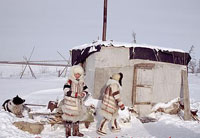 west
Siberia. They are the original inhabitants of the Taymyr. Their
language belongs to the Samoyedic group. In earlier times the
Nganasans lived as nomads in the Siberian tundra. Not until the
early 17th century did they come into contact with the
Russians, through whom they gained access to weapons and alcohol.
The Russians also brought diseases to which the nomadic people had
not previously been exposed. These factors caused a rapid decline
in the Nganasan population. At the end of the 17th
century Russian Orthodox missionaries reached the Nganasan
territory. Many were converted, but the results were superficial –
shamanism remained strong even among the converts. west
Siberia. They are the original inhabitants of the Taymyr. Their
language belongs to the Samoyedic group. In earlier times the
Nganasans lived as nomads in the Siberian tundra. Not until the
early 17th century did they come into contact with the
Russians, through whom they gained access to weapons and alcohol.
The Russians also brought diseases to which the nomadic people had
not previously been exposed. These factors caused a rapid decline
in the Nganasan population. At the end of the 17th
century Russian Orthodox missionaries reached the Nganasan
territory. Many were converted, but the results were superficial –
shamanism remained strong even among the converts.
Because
the Nganasans lived so remotely they escaped much of the
devastation which other Siberian peoples had to suffer, and their
traditional nomadic life continued even after the October
Revolution. But when political “missionary work” developed, the
Nganasan children were eventually forced to go to boarding schools
to learn Russian – and forget their mother tongue. From the 1970’s
the Nganasans could no longer avoid the changes which Soviet
industrialisation brought. The entire economy of the Taymyr region
was dominated by the massive installations built at Norilsk. The
factories were damaging the environment and causing severe health
problems and great infant mortality.
Today there are barely 1,000
Nganasans. Village life is tough, many are unemployed, alcoholism
is widespread, and there is a great sense of futility. “But in the
midst of all this there is still hope,” said Lena Shatilova,
project coordinator for the Nganasan translation. “In one of these
villages fifteen Nganasans have recently come to faith. The
neighbours are wondering what’s happened when they see their
changed lives – they’re no longer drinking, their families are
healthy, and they’re taking good care of their children! Everyone
I spoke to was thrilled to get a book of the Bible in Nganasan!”
15.06.2005
|
Book of Proverbs published in Avar and Bezhta
Within the framework of translating the Old Testament into the
non-Slavic languages of the Russian Federation the Institute for
Bible Translation has published the Book of Proverbs in the
Dagestani languages of Avar (more than 750,000 speakers) and
Bezhta (more than 8,000 speakers). The Institute has cooperated on
both translations with the Dagestani Centre of the Russian Academy
of Sciences. Churches, libraries, academic bodies and cultural
institutions of the Republic of Dagestan have been supplied with
the two publications.
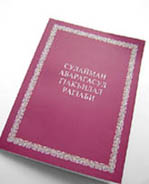 The
Avars and Bezhtas belong to the West Caucasian language family.
The Avars are the most numerous of the Dagestani peoples and have
a rich literary tradition that is several centuries old. However,
in Bezhta the first printed materials have only just appeared. The
Avars and Bezhtas are Muslims like the other ethnic groups of
Dagestan. The
Avars and Bezhtas belong to the West Caucasian language family.
The Avars are the most numerous of the Dagestani peoples and have
a rich literary tradition that is several centuries old. However,
in Bezhta the first printed materials have only just appeared. The
Avars and Bezhtas are Muslims like the other ethnic groups of
Dagestan.
The
Book of Proverbs is one of the so-called Wisdom books of the Old
Testament and is a collection of wise expressions. In Old
Testament times these were
highly prized, something which even
today
is close to the cultural tradition of the
Caucasian peoples among
whom the wisdom of previous generations is
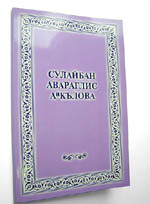 treasured.
The Hebrew word, mashal, with the meaning of “saying, proverb,
words of wisdom, expression, or riddle” has via its Arabic
equivalent, misal, or masal, even entered the North Caucasian
languages and is still used today with a similar meaning. treasured.
The Hebrew word, mashal, with the meaning of “saying, proverb,
words of wisdom, expression, or riddle” has via its Arabic
equivalent, misal, or masal, even entered the North Caucasian
languages and is still used today with a similar meaning.
The
sayings from Proverbs are based on everyday experience and are
enhanced by the teaching about divine Wisdom and one’s attitude
towards the Creator (“The fear of the Lord is the beginning of
knowledge.” 1:7). Many of the proverbs have become familiar
sayings in various languages. In English, for example: “a soft
answer turns away wrath” (15:1); and “pride goes before a fall”
(16:18). It is hoped that this book will not only serve to
disseminate biblical wisdom but also contribute to the development
of the language and culture of the Avars and Bezhtas.
Yakov Tesmelets
exegetical checker
of the Avar and Bezhta project
Other
Old Testament books recently published by IBT are: Genesis in
Adygei (approximately 130,000 speakers) and a collection of Ruth,
Esther and Jonah in Nogai (approximately 90,000 speakers).
23.05.2005 |
The award to Dr. Marianne Beerle-Moor, Director of the Institute for
Bible Translation Russia/CIS, of an honorary doctorate by the
Russian Academy of Sciences
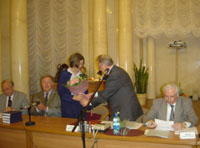 On
23 May 2005 the Russian Academy of Sciences (RAS), on the
submission of the Department of Historical and Philological
Sciences, awarded Dr. Marianne Beerle-Moor, Director of the
Institute for Bible Translation Russia/CIS, with the academic
title of Doctor (honoris causa). The ceremony took place at the
RAS Presidium in Moscow in the presence of renowned scholars and
academicians. RAS President Academician
Yuriy
Osipov noted the selfless and devoted On
23 May 2005 the Russian Academy of Sciences (RAS), on the
submission of the Department of Historical and Philological
Sciences, awarded Dr. Marianne Beerle-Moor, Director of the
Institute for Bible Translation Russia/CIS, with the academic
title of Doctor (honoris causa). The ceremony took place at the
RAS Presidium in Moscow in the presence of renowned scholars and
academicians. RAS President Academician
Yuriy
Osipov noted the selfless and devoted
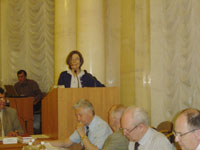 activity
of Dr. Marianne Beerle-Moor, her fruitful work in the field of
Bible translation into the
non-Slavic languages of Russia/CIS, as well as her scientific
contribution to linguistics and ethno-linguistics. activity
of Dr. Marianne Beerle-Moor, her fruitful work in the field of
Bible translation into the
non-Slavic languages of Russia/CIS, as well as her scientific
contribution to linguistics and ethno-linguistics.
Marianne Beerle-Moor, Swiss by birth, graduated from the
Pedagogical Department of Freiburg University (Switzerland) in
1968, Kolding Bible College (Denmark) in 1971, and the Linguistic
Department of Zurich University in 1982, where she defended her
PhD thesis on the problems of the Lezgi verb in 1984. The focus of
Beerle-Moor’s scientific interest at that time was research into
the morphological analysis of the Lezgi verb and the noun in the
Chechen language. The results of her investigations meant a
considerable improvement in the descriptive system of grammar in
these languages.
Marianne Beerle-Moor spent much time and effort on the studies of
the sociolinguistic problems of the Dagestan languages in Turkey
where she traveled from 1979 and resided, partly in Istanbul,
partly in Lezgi and Chechen villages, from 1985 to1988, sharing
the way of life with the local population.
Since 1994 Marianne Beerle-Moor has worked in Russia. In 1997 she
became the leader of the Institute for Bible Translation, which
was founded in Sweden in 1973 and was registered as an independent
Russian organization in 1995. Applying her knowledge of exegesis,
linguistics and ethno-linguistics, Marianne Beerle-Moor directs
the activity of the Russian IBT organization, which works with 65
non-Slavic languages. Under her leadership the New Testament has
been translated into 15 languages, portions of the Bible into 54
languages, and by 2006 the New Testament will have been translated
into 3 more languages (for the first time ever).
In
February 2002 Dr. Marianne Beerle-Moor was awarded the Order,
Third Class, “For Serving the Native Land” of St. Dmitriy Donskoy
and St. Sergius of Radonezh for the work of enlightenment and
merits in the spiritual and moral formation of Russian society. In
May 2005 on the Decree of the Yakut President Dr. Beerle-Moor was
awarded the “Civil Valor” Order for the revival of spirituality
and the translation of the New Testament into the Yakut language.
The activity of the Institute, headed by Dr. Marianne Beerle-Moor,
plays an important role in the preservation and development of the
endangered languages of Russia/CIS and the revival of those close
to extinction.
13.05.2005 |
The first complete New Testament for the
Yakuts in north-east Siberia
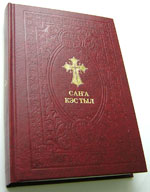 On
11-12 May celebrations of the dedication of the New Testament in
the Yakut language were organized at the highest government level
in the Republic of Yakutia. The presentation was held in the Yakut
capital, Yakutsk, and not only were many bishops and priests
there, but even the president of Yakutia attended. It is the first
ever complete New Testament for almost half a million people. The
Yakuts live in an area as large as that of India. Yakutia is part
of Siberia, and one of its villages is the coldest inhabited place
in the world. On
11-12 May celebrations of the dedication of the New Testament in
the Yakut language were organized at the highest government level
in the Republic of Yakutia. The presentation was held in the Yakut
capital, Yakutsk, and not only were many bishops and priests
there, but even the president of Yakutia attended. It is the first
ever complete New Testament for almost half a million people. The
Yakuts live in an area as large as that of India. Yakutia is part
of Siberia, and one of its villages is the coldest inhabited place
in the world.
The
translation team and Marianne Beerle-Moor, director of the work in
Russia and the CIS, represented IBT.
Unfortunately the team’s philological checker was unable to attend
– he will be 100 next year and felt too weak after a period in
hospital. Nevertheless, since this man is well-known and loved
throughout Yakutia, just the fact that he took part in the
translation work means that everyone will want to read the Yakut
New Testament. The occasion received extensive media coverage in
Yakutia – a lot of TV interviews, newspaper articles.
The next
day passages from the Yakut New Testament were read at the liturgy
service in the main cathedral and several times at concerts.
Following one such concert, Valentina Romanova wrote in the
“Yakutia” newspaper:
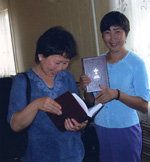 “I
heard the text of the Gospel in Yakut at a concert to mark the day
of Saints Cyril and Methodius (translators of the Bible into
Slavonic).The Beatitudes from the Sermon on the Mount were read in
modern Yakut language. The Word of God in my native tongue made a
great impression on me. It entered deep into my soul, and my heart
responded with joy and love.“Sometimes
when you read literature in our native Yakut language, it’s
difficult to understand. So when I got the Yakut New Testament I
wondered whether the Word of God would be comprehensible and
conceivable in Yakut. I believed that it would be, and it really
was! That was the day when I received this precious book as a gift
from the Lord. It was such a joy! It seemed as if the book glowed
with divine ardour. It was obvious that God’s blessing was upon
it. As I began to read I kept thinking: ‘Lord, You’re talking to
me!’ It was easy for the Word of God to enter my heart bringing
light, and with tears of deep emotion my soul welcomed God. The
words were not only understandable, it seemed as if the Lord and
his apostles had originally spoken Yakut. As if the Gospel had
always sounded like that – so clear and natural. As if there had
been no separation of time, space and language. Our translators
have succeeded in overcoming many difficulties. Now reading the
Gospel is as natural as breathing for me.” “I
heard the text of the Gospel in Yakut at a concert to mark the day
of Saints Cyril and Methodius (translators of the Bible into
Slavonic).The Beatitudes from the Sermon on the Mount were read in
modern Yakut language. The Word of God in my native tongue made a
great impression on me. It entered deep into my soul, and my heart
responded with joy and love.“Sometimes
when you read literature in our native Yakut language, it’s
difficult to understand. So when I got the Yakut New Testament I
wondered whether the Word of God would be comprehensible and
conceivable in Yakut. I believed that it would be, and it really
was! That was the day when I received this precious book as a gift
from the Lord. It was such a joy! It seemed as if the book glowed
with divine ardour. It was obvious that God’s blessing was upon
it. As I began to read I kept thinking: ‘Lord, You’re talking to
me!’ It was easy for the Word of God to enter my heart bringing
light, and with tears of deep emotion my soul welcomed God. The
words were not only understandable, it seemed as if the Lord and
his apostles had originally spoken Yakut. As if the Gospel had
always sounded like that – so clear and natural. As if there had
been no separation of time, space and language. Our translators
have succeeded in overcoming many difficulties. Now reading the
Gospel is as natural as breathing for me.”
26.04.2005
|
Children’s Bible in Buryat
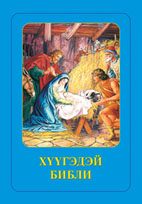 IBT
has issued the 32nd translation of the book of Bible stories so
popular among Russian readers. The Children’s Bible was published
originally in Russian and subsequently in many of the non-Slavic
languages of Russia and the CIS. For many people it would be the
first step towards becoming acquainted with the Bible. IBT
has issued the 32nd translation of the book of Bible stories so
popular among Russian readers. The Children’s Bible was published
originally in Russian and subsequently in many of the non-Slavic
languages of Russia and the CIS. For many people it would be the
first step towards becoming acquainted with the Bible.
There are 445,000
Buryats, 86.5 percent of whom speak Buryat as their mother tongue.
So the edition of 7,600 copies is relatively small. The books
should arrive in Buryatia and the neighbouring regions by the end
of May. They will be supplied to schools, libraries and churches
so that as many readers as possible will get to know this new,
beautifully illustrated publication.
Work began on the
translation in 1999, with poet D. Raisanova, Ph.D, as translator;
Professor S. Budayev, Ph.D, as philological checker; and S.A.
Sychev as exegetical checker. V. Raisonova conducted the
comprehension testing.
Testing the
comprehensibility of the translation was an important stage of the
work. It was carried out both in the Buryat capital, Ulan-Ude, and
in remote villages and settlements of the region. There are four
regional groups of Buryat dialects. Speakers of different dialects
took part in the testing. Although the Khorin standard dialect
formed the basis of the translation, all the participants could
understand the text. It is, however, important that this book is
acceptable not only to Christians but also to the Buddhist
majority.
Even before its
appearance the Buryat Children’s Bible has provoked great interest.
It will undoubtedly take its place in children’s literature and
also be of use as teaching material in schools. So both children
and their parents will become familiar with the biblical text.
Thus it will lay the foundation for the acceptance of the Buryat
New Testament, the publication of which is planned for 2006.
06.04.2005 |
The Rutul people have their first bible
portion – Luke’s Gospel
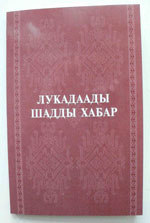 The Rutul people are one of the original
peoples of Dagestan. Today they number approximately 28,000. The
Rutuls have a rich history. The word “Rutul” can be found on
monuments from the 15th century. As early as the 13th century they
are mentioned in Arab writings. The Rutul people are one of the original
peoples of Dagestan. Today they number approximately 28,000. The
Rutuls have a rich history. The word “Rutul” can be found on
monuments from the 15th century. As early as the 13th century they
are mentioned in Arab writings.
In 1991 the Dagestan authorities decided
that there should be a better knowledge of local languages. Since
then schooling has begun in Rutul. A spelling book and school text
books with the new Rutul script have been published.
At about the same time as the new Rutul
script was introduced, IBT began to translate Luke’s Gospel into
Rutul. The first translator was a lecturer at the University of
Dagestan, but he used a different dialect from that on which the
written language is based. So we were obliged to find another
translator, also a university lecturer, but one who has the right
dialect as mother tongue.
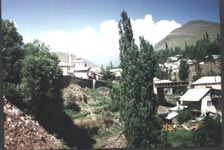 The Rutul people were Christian until the
8th century, but Arab traders introduced Islam, and with the
Ottoman conquest in the 16th century Islam became the predominant
religion in Dagestan. The Rutuls’ faith is expressed mainly
through clinging to their traditions. “Some Rutuls go to different
churches in Mahachkala – some from curiosity, and others out of
real interest. In these difficult times the Rutuls need not just
material wellbeing – they need the word of the Bible in their
language,” says the text checker of the Rutul translation. The Rutul people were Christian until the
8th century, but Arab traders introduced Islam, and with the
Ottoman conquest in the 16th century Islam became the predominant
religion in Dagestan. The Rutuls’ faith is expressed mainly
through clinging to their traditions. “Some Rutuls go to different
churches in Mahachkala – some from curiosity, and others out of
real interest. In these difficult times the Rutuls need not just
material wellbeing – they need the word of the Bible in their
language,” says the text checker of the Rutul translation.
05.02.2005
|
Presentation of Luke’s Gospel in Chukchi in Anadyr
The presentation
of the first edition of the full text of Luke’s Gospel in Chukchi
took place on 5 February in Anadyr on the intiative of the
Chukhotka Heritage Museum Centre. Two thousand copies with
accompanying audicassettes were delivered to Chukhotka in July
2004. They are being distributed free of charge in the churches.
In addition, all the libraries of Chukhotka’s Cultural
Administration have copies.
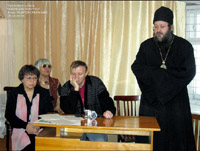 At
the presentation Diomid, Bishop of
Anaydyr
and Chukhotka,
described the publication of Luke’s Gospel in Chukchi as an
historic event. Translation checker Alla Kerginto spoke about the
work of translator Ideya Kulikova, checkers YergeniyaTyneru,
Antonina Kymytval and herself. Academics, poets and leaders of
social and church organisations were among the speakers.
Specialists in the Chukchi language stressed both the good
literary quality of the At
the presentation Diomid, Bishop of
Anaydyr
and Chukhotka,
described the publication of Luke’s Gospel in Chukchi as an
historic event. Translation checker Alla Kerginto spoke about the
work of translator Ideya Kulikova, checkers YergeniyaTyneru,
Antonina Kymytval and herself. Academics, poets and leaders of
social and church organisations were among the speakers.
Specialists in the Chukchi language stressed both the good
literary quality of the
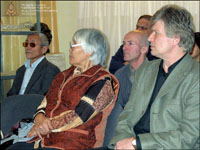 translation and its comprehensibility
for a wide readership. It was also pointed out that the
audiocassettes would help those Chukchis who were no longer
proficient in their native language to learn it. Alla Kerginto,
who was also involved in the recording, has also read several
excepts from the Gospel on local radio. In Chukhotka the radio
plays an important role: it is often the only source of
information in the remote settlements and camping grounds of the
nomads. The Institute for Bible Translation hopes that this
practice of reading the Gospel on radio will be continued and
further developed, and that the Bible in the native language will
reach new readers and listeners. translation and its comprehensibility
for a wide readership. It was also pointed out that the
audiocassettes would help those Chukchis who were no longer
proficient in their native language to learn it. Alla Kerginto,
who was also involved in the recording, has also read several
excepts from the Gospel on local radio. In Chukhotka the radio
plays an important role: it is often the only source of
information in the remote settlements and camping grounds of the
nomads. The Institute for Bible Translation hopes that this
practice of reading the Gospel on radio will be continued and
further developed, and that the Bible in the native language will
reach new readers and listeners.
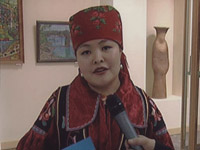 18.01.2005
|
Presentation
of John’s Gospel, the Letters of John, and Revelation in Khakas in
Abakan 18.01.2005
|
Presentation
of John’s Gospel, the Letters of John, and Revelation in Khakas in
Abakan
In
the autumn of 2004 the Institute for Bible Translation published a
new volume containing John’s Gospel, the Letters of John and
Revelation in Khakas.
The presentation took place in the regional
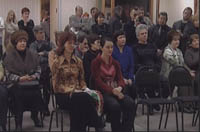 museum
of Abakan on 18 January 2005. Members of the Khakas team,
translator I. Topoyev and checkers S. Sychev, T. Borgayakova and
G. Litvinenko, spoke about IBT, the principles of Bible
translation, the difficulty and diverse nature of this work, the
strict criteria that IBT applies in order to produce a translation
of good quality. Those present, including representatives of
social organisations, the museum
of Abakan on 18 January 2005. Members of the Khakas team,
translator I. Topoyev and checkers S. Sychev, T. Borgayakova and
G. Litvinenko, spoke about IBT, the principles of Bible
translation, the difficulty and diverse nature of this work, the
strict criteria that IBT applies in order to produce a translation
of good quality. Those present, including representatives of
social organisations, the
 Ministry
of Education, cultural figures, teachers and museum staff
expressed great interest in the work of the translation team and
the resulting IBT publication. “This is an important contribution
to the development of the language. It shows that the Khakas
language is able to convey difficult theological concepts and to
express all the richness and depth of the Johannine books of the
New Testament.” This book gives its readers hope and pride in
their language. Ministry
of Education, cultural figures, teachers and museum staff
expressed great interest in the work of the translation team and
the resulting IBT publication. “This is an important contribution
to the development of the language. It shows that the Khakas
language is able to convey difficult theological concepts and to
express all the richness and depth of the Johannine books of the
New Testament.” This book gives its readers hope and pride in
their language.
14.01.2005
|
Presentation
of the Ossetic New Testament in Vladikavkaz
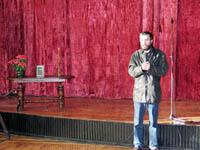 The
presentation of the New Testament in Ossetic took place on 14
January in Vladikavkaz at the National Library of the Republic of
North Ossetia. The event was organised by the Institute for Bible
Translation and North Ossetia’s Ministry of Culture and was
attended by more than 100 guests, including L. Dzugayev, the
minister of culture; L. Khassiyev, director of the House of
Culture; L. Tarayeva, chief of the Ministry of Nationalities
department The
presentation of the New Testament in Ossetic took place on 14
January in Vladikavkaz at the National Library of the Republic of
North Ossetia. The event was organised by the Institute for Bible
Translation and North Ossetia’s Ministry of Culture and was
attended by more than 100 guests, including L. Dzugayev, the
minister of culture; L. Khassiyev, director of the House of
Culture; L. Tarayeva, chief of the Ministry of Nationalities
department
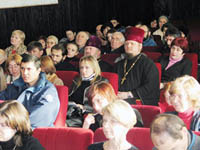 responsible
for religious affairs; as well as by representatives of church,
academic and cultural organisations. It began with Ossetic
spiritual songs sung by the male voice choir of the state
Philharmonia led by Olga Dzhanayeva. responsible
for religious affairs; as well as by representatives of church,
academic and cultural organisations. It began with Ossetic
spiritual songs sung by the male voice choir of the state
Philharmonia led by Olga Dzhanayeva.
Archpriest Vladimir Samoylenko, IBT Director Dr Marianne
Beerle-Moor, exegetical checker Dmitriy Asratyan, coordinator
Ketevan Gadilia, Prof. Tamerlan Guriyev and others greeted those
present.
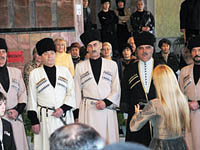 The
speakers stressed the importance of the event - a significant
landmark for the Ossetic people and a vital contribution to the
country’s spiritual and moral development. It was noted that the
publication of the New Testament, although very important, was not
the final stage of the work on translating the Bible into Ossetic.
The Institute is currently working on the translation of Psalms,
while the books of Genesis and Exodus are being prepared for
printing and will be published next year. The
speakers stressed the importance of the event - a significant
landmark for the Ossetic people and a vital contribution to the
country’s spiritual and moral development. It was noted that the
publication of the New Testament, although very important, was not
the final stage of the work on translating the Bible into Ossetic.
The Institute is currently working on the translation of Psalms,
while the books of Genesis and Exodus are being prepared for
printing and will be published next year.
|
Share: